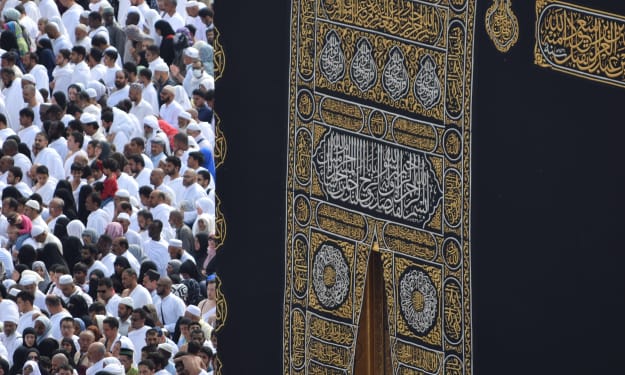
Islam is the world’s second largest religion with about 1.8 billion adherents across the globe. The religion is based on two key tenets: there’s no god but Allah, and the Prophet Muhammad ﷺ is Allah’s final messenger. Whoever believes in them is a Muslim – meaning, a follower of Islam.
The word Islam basically means “peace” and Muslim means anyone that “surrenders to Allah”. Surrendering to Allah is the goal for a Muslim throughout his life. When the complete surrender happens, he become fearless and nothing worries him. For the purpose of surrender, Allah has outlined many prayers and rituals for Muslims to achieve complete surrender and a state of bliss. Before we get into the details of Islam, let’s first find out how Islam started in deserts of Arabia and how Muhammad ﷺ became a Prophet.
The Birth of the Religion of Peace
Over 1400 years ago, the religion of Islam was born in Mecca, now in modern-day Saudi Arabia. This is the place where Hazrat Ibrahim, established the Kaaba, the house of God. That’s why Kaaba has a very long history and crucial value in the Islamic community.
Prophet Muhammad ﷺ was born in Mecca, and at the age of forty he was bestowed with the Prophethood. Although, even before becoming a Prophet he had been the most pious man in Arabia.
When Allah chose him as the Prophet, he had shivers because Angel Jibreel brought the first revelation in the most surreal way in the cave of Hira. Muhammad ﷺ went to his wife and she confirmed him as the last Prophet. Later he started preaching the word of God and spent his life in the struggle for propagating Islam.
Islamic Festivals
There are many festivals in Islam. However, two are the most important: Eid ul Fitar and Eid al Adha. These two festivals are celebrated in every Muslim community across the world. Also, every Muslim ethnic group and race has a different way of enjoying the festivity, except that the religious rites remain uniform.
Eid Ul Fitr
Eid ul Fitr is the first day after the end of the month of Ramadan and it marks a celebration for an entire month of fasting. On the day of Eid ul Fitr, people pray the special Eid prayer in the morning after which friends and family mingle up and celebrate the day together. On this day, Muslims eat special foods, specially prepared for the occasion of Eid.
Eid Ul Adha
The other Eid is Eid ul Adha, which is a very big day. On the occasion of Eid Adha, Muslim slaughter cattle: cow, sheep, goat, etc. as an offering to God.
Offering a sacrifice is the primary purpose of Eid ul Adha and it’s a sunnah of Hazrat Ibrahim, who agreed to offer his son, Hazrat Ismail, as a token of devotion to Allah Almighty. Prophet Muhammad ﷺ later carried forward the Sunnat e Ibrahimi.
Hence, these to Eids are the biggest festive occasions in Islam.
The Main Pillars of Islam
The creed of Islam has five main pillars. These five pillars take a Muslim to the ultimate goal of Islam, which is surrendering to Allah becoming free of all desire and fear.
The five pillars of Islam are namely: kalima, salah (namaz), zakat, saum (roza), and hajj.
Let’s go into the pillars and understand them one by one.
Kalima
In Islam the first pillar is a Muslim’s announcement that he or she believes there’s no God but Allah and the Prophet Muhammad ﷺ is His messenger. That’s called the Kalima.
There are six Kalimas, mainly taught in South Asian Islamic schools, however, in Islam there’s no restriction to the numbers of Kalimahs, because they are all taken from hadiths of the Holy Prophet Muhammad ﷺ.
So, kalima is the first step for anyone to enter Islam and become a Muslim. Without professing Allah’s greatness and prophethood of Muhammad none can be a believer.
Namaz (Salat)
Salat is the second pillar of Islam, and this is the first that thing that a Muslim will questioned about after death. Salah literally means, connection, and it’s the act of making a connection with the Almighty.
There’s a certain method to praying salah, which the Prophet ﷺ taught the Sahaba.
There are five salahs in a day and each salah is composed of the same actions and gestures but different number of rakats (units to be prayed). There’s optional supplication in the end, which was highly recommended by the Prophet ﷺ.
The daily five prayers are Fajr, Zuhr, Asar, Maghrib and Isha.
Zakat
Zakat is the third pillar of Islam and the literal meaning of the word is to “purify” oneself. Zakat is a fixed amount set by Allah Almighty, to be donated by those Muslims who can afford to give.
Zakat is an obligation on the rich. People that can afford have to pay out must do so and help those in need.
Zakat helps to manage the wealth of a society right and equal distribution of wealth is made possible.
Also, those who avoid giving zakat despite enjoying the power of money will be in serious trouble in the life after death. And, those giving zakat will be purified and clean.
Roza (Saum)
Fasting is called saum (roza) in Islam, and there’s an entire month for the purpose of fasting called Ramadan. Ramadan begins after the month of Shaban, and throughout the month, Muslims fast from dawn till sunset.
There are certain rules to follow. Observing those validates one’s fast while failure to follow them breaks the fast.
Ramadan is the month when your sins burn and good deeds multiply thousand times. It’s a month trials because one has to stay hungry, but brings in eternal rewards.
Hajj
Hajj is the annual Islamic pilgrimage.
Is is an obligation on Muslims that can afford to go to Mecca and Kaaba, the House of Allah, and perform the pilgrimage with its rites and rituals.
Hajj has many steps, out of which not all are mandatory. The main steps however must be accomplished for Hajj to be valid.
A lot of Muslims may not be able to perform Hajj because of health and financial restrictions. If the reasons are genuine, they are easily exempt from performing Hajj.
Conclusion
To sum it up, Islam is the code of life. It contains the path for anyone that is seeking light and transformation.
The ideology of Islam talks about all aspects of life and teaches you how to live the life to the fullest without getting caught in stress, anxiety, depression and fear.
For a Muslim, a follower of Muhammad ﷺ, the ultimate goal is to achieve complete surrender to Allah.
Around the surrender revolve all of the Islamic values, festivals, traditions and rituals.
A Muslim should strive to attain eternal peace by following in the footsteps of Prophet Muhammad ﷺ and holding fast to Quranic teachings.
Would you like to share your knowledge of Islam? Write in the comments below!





Comments
There are no comments for this story
Be the first to respond and start the conversation.